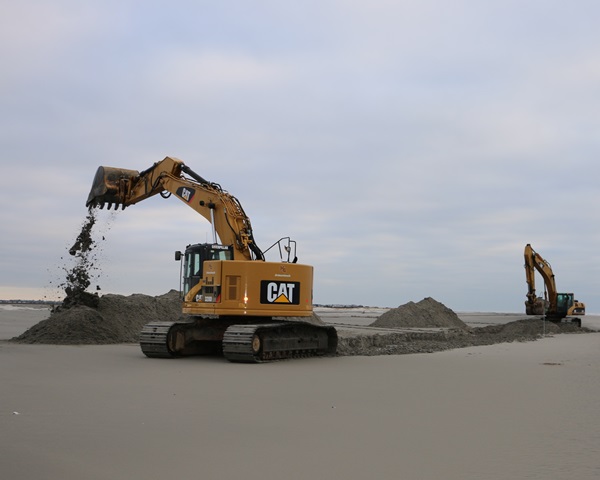
The beach restoration phase of a habitat and coastal resiliency project on Stone Harbor Point is set to begin. The project will transfer sand from both onsite and offsite sources to construct elevated habitat areas for beach-nesting and migratory birds and enhance existing dune features to provide protection to the community from southerly approaching storms.
The New Jersey Audubon received a grant through National Fish and Wildlife Foundation’s Hurricane Sandy Coastal Resiliency Competitive Grant Program to restore and enhance beaches at Stone Harbor Point, Cape May. The organization is partnering with L. J. Niles and Associates, the Wetlands Institute, U.S. Fish and Wildlife Service, Conserve Wildlife Foundation, NJ Division of Fish and Wildlife, Richard Stockton College of NJ Coastal Research Center, and the Borough of Stone Harbor to increase available quality habitat for migratory and beach nesting birds, and coastal resiliency for the Borough and its residents.
Stone Harbor Point provides a protective barrier to the Borough of Stone Harbor from damaging coastal storms and sea level rise. Sand from re-nourishment activities north of the Point provides a continual resupply of sand to the area through southerly longshore drift. This ensures a long-term supply of sand for restoration. Through local sand harvesting (ie. no dredging or trucking in sand) they will build elevation and improve habitat quality for coastal birds, and reduce coastal flooding. Because materials are present locally, the cost for sand acquisition and transport will be greatly reduced and sustainable.
Through monitoring they will document any biological impacts of sand harvesting on intertidal invertebrate communities to determine if this method is an ecologically sound approach for protected wildlife areas. They will also monitor use of the site by migratory shorebirds (Red Knot, Semipalmated Sandpiper, Sanderling, Semipalmated Plover, Black-bellied Plover, American Oystercatcher, etc.) and beach nesting birds (Piping Plovers, American Oystercatchers, Black Skimmers, Least Terns). Furthermore, they will conduct outreach programs to decrease human disturbance at the site and predator control to ensure improved nesting success.
The NFWF Hurricane Sandy Coastal Resiliency Competitive Grant Program is supporting projects that will assess, restore, enhance or create wetlands, beaches and other natural systems to help better protect communities and to mitigate the impacts of future storms and naturally occurring events on fish and wildlife species and habitats. The program received 375 applications requesting over $563 million. Of these, 54 were funded for a total of $102.75 million.
New Jersey Audubon’s research department began collecting baseline information on the species making up the intertidal invertebrate communities at Stone Harbor Point in the fall of 2014. Click here for more details on this phase of the project.
Access to Stone Harbor Point will be temporarily closed beginning Tuesday, February 10, 2015 as beach restoration construction begins. For more information, please click here for the announcement from the Borough of Stone Harbor, as well as links to other partner websites.